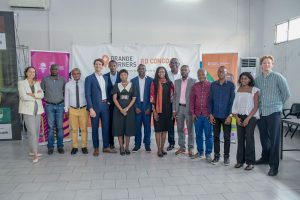We realize these are a lot of buzzwords in one title. Nevertheless, the consequences of globalisation and digitalisation are going to be felt in every aspect of our daily lives, our societies and our economies. It is crucial to understand how to respond to the questions they involve: will the next wave of globalisation and digitalisation speed up sustainable development? Or will it pose a severe threat to the future of work?
Last week the Ministry of Foreign Affairs of the Netherlands hosted a public seminar to address these questions. To no longer keep you in suspense, let us reveal the most important take away, in the words of Director Sustainable Economic Development Steven Collet*: “digitalisation and globalisation can create great opportunities, both for lower skilled and educated workers, but we have to make sure it’s an inclusive, accessible and clear game. Especially for young people and woman.” Interestingly, a recent World Bank report and thought leaders at the World Economic Forum in Davos point in the same direction. Yet, we will not reap the benefits if we continue with business as usual; a different game and strategy is needed. How do we prepare the next generation for tomorrows digital workplace and the new responsibilities involved?
First of all, reshaping skills through education and training plays a vital part in preparing for the developments ahead. With millions of young people entering the job market each year, the importance of enhancing youth employability and entrepreneurship seems more important than ever. From a young age, children will need to develop a wide range of skills that include more than numeracy and literacy; more cognitive, social emotional and entrepreneurial skills such as problem solving, teamwork and creativity. Skills that cannot be replicated by machines and prepare for dealing with unknown and unexpected situations. Or as mr Schleicher, Director of Education and Skills of the OECD, puts it: “We should never forget that education is more than preparing young people for jobs. We used to learn to do the work, now learning is the work.” At Orange Corners, we aim to equip entrepreneurs with these 21st century skills.
In the panel discussion, H.E. Ambassador of Rwanda Jean Pierre Karabaranga, Social entrepreneur Dalia Yusif from Orange Corners Sudan and Professor Marleen Dekker importantly emphasized the role of young women and rural youth in low- and middle income countries. As a large amount of women perform office and administration tasks that can easily be automated, while being under-represented in growing industries without chimneys.
Furthermore, to reap the benefits of digital technologies, African countries need supportive policies and investment to ensure sufficient market competition, including better physical and digital infrastructure. The Netherlands policy of Foreign Trade and Development cooperation is actively working on creating an enabling environment through private sector development and investing in the skills of young people to facilitate their transition from schools to work. Besides Orange Corners, the Netherlands has launched the Challenge Fund for Youth Employment that aims to provide prospects for 200.000 men and women in Africa and the Middle East.
Finally, Ambassador for Youth Tijmen Roosenboom concludes with a compelling story written by Juval Harari, in which he compares the digital transition to when cars replaced the horse-drawn carriages. Whereas the horses where ‘degraded’ to carrying girls around stables on Saturday, carriage drivers got the opportunity to become chauffeurs of automobiles. To reap the benefits of digital technologies, Orange Corners aims to reshape both skills and the environment to enable young people to become the chauffeurs instead of the horses. To ensure that none of us keep performing the tasks of 19th century horses, we can state, that #strategymatters.





